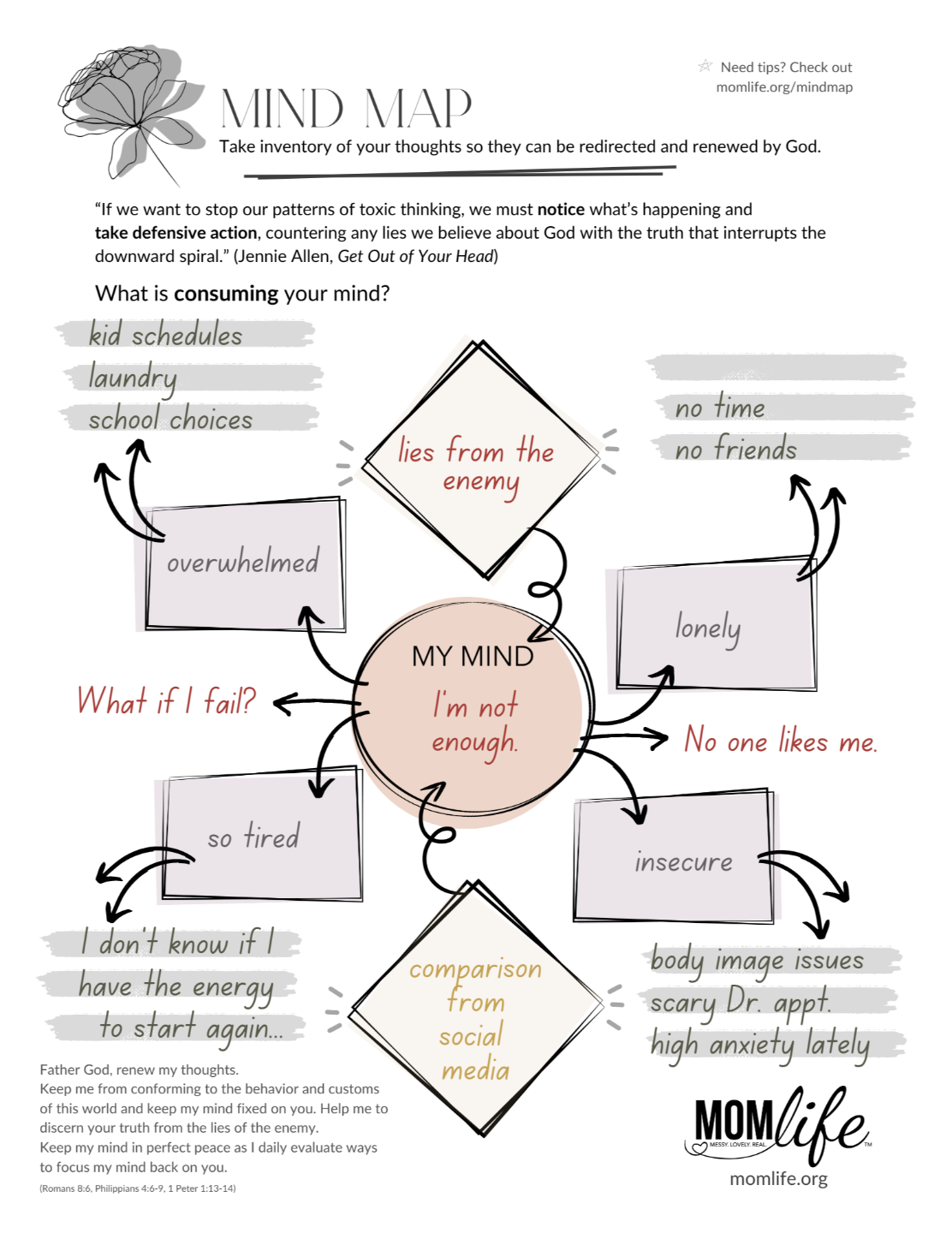Mind Map
Our thought life is so important! It drives how we feel, what we say, and what we do.
God’s Word has much to say about how we fill our minds: Philippians 4 tells us to guard our minds from worry and anything that isn’t true, honorable, right, pure, lovely, and admirable. 1 Peter 1 tells us to prepare our minds for action, exercising self-control while putting all our hope in Christ. Ephesians 4 tells us to renew our minds by putting off our old self with its deceitful desires and putting on our new self—the one created according to God’s likeness to live like him in love, truth, and faithfulness.
What we focus our mind on shapes who we become.
Pausing to take inventory of what is going on in our minds is the first step in allowing God to redirect and renew our thoughts.
We can start this practice by making a mind map.
What is a mind map?
A mind map is a diagram used to visually organize information, showing relationships between pieces and parts of the whole.
It features one main idea at the center, with subtopics branching out and connecting to supporting ideas. The process of creating a mind map can be incredibly powerful. It helps us to notice and sort out our thoughts in one place and then begin to make connections. Creating a mind map encourages us to become curious about our thoughts, helping us to explore them from multiple angles.

"If we want to stop our patterns of toxic thinking, we must notice what’s happening and take defensive action, countering any lies we believe about God with the truth that interrupts the downward spiral.
(Jennie Allen, Get Out of Your Head)
What primary thought is consuming your mind?
Whatever it is, write it down in the center circle of the page.
You might write: I am a failure. What I have to say doesn't matter. It's all too much. I need to be more in control. I am a burden to others. I'm alone...
How does that thought(s) make you feel?
Write these things in the boxes outside of the center circle.
You might write: Anxious. Overwhelmed. Lonely. Exhausted. Angry...
Then on the gray lines outside of the boxes, write anything that is possibly contributing to those feelings: beliefs, circumstances, behaviors, tasks, relationships, limits, decisions... Keep going until you have listed every possible think you can think of.
What is feeding your thoughts?
Write these things in diamond shapes with arrows pointing into the center circle. This is anything that might be actively or passively contributing to your thoughts and feelings.
They include things you watch, read, hear, and see. You might write: social media comparisons, relational pressure, things people have said, negative self-talk, general media (tv, books, music, podcasts), news/current events, external pressures...
Look to the Lord for renewal.
As you review everything you have written, ask the Lord to help you determine what needs to be released and/or redirected. Talk with God about what is on the paper in front of you. Ask him to show you what you are believing wrongly about yourself, others, and most importantly about him. Ask him to reveal patterns and common themes in your thoughts and feelings. Ask him for help to release the things you cannot control and clarity in understanding what needs to change.
Everyday is an active battle to guard and prepare our minds. It is crucial to submit our thoughts to God and ask the Holy Spirit to guide us and help us discern what to fill our minds with that give hope, energy, healing, and life. Because apart from the truth and authority of God's Word, our minds will always default to worldly pleasures, worries, and lies.

Take it one step further.
Consider, What does God say about this thought(s)? We learn what God thinks through reading and studying scripture and through having spiritual conversations with trusted friends who point us to Jesus.
Check out these Truth Statements for a list of scriptures to read the next time the enemy tries to discourage you (or a loved one) with a lie. Scripture prepares us for the battle in our mind.
Download: Truth Statements
